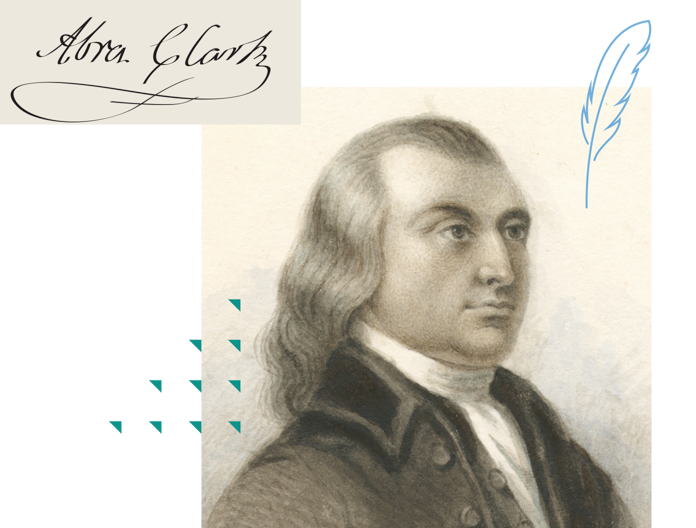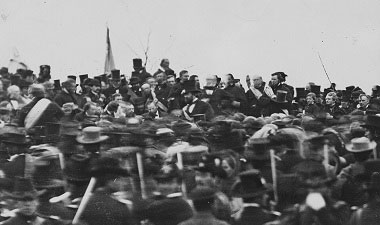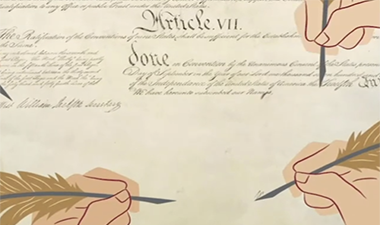Summary
Abraham Clark was a surveyor, lawyer, and sheriff from New Jersey who supported independence from Britain and signed the Declaration.
Abraham Clark | Signer of the Declaration of Independence
2:55
Biography
Abraham Clark was born in Elizabethtown, New Jersey, the only child of Thomas and Hannah Clark. Thomas noticed that his son had a talent for mathematics, so he hired a tutor to teach Abraham surveying. Clark was not content to remain a surveyor, however, so he taught himself law. He set up a practice that did not focus on increasing his wealth. Instead, he earned a positive reputation as “the poor man’s councilor” because of his willingness to defend those who could not afford a lawyer’s fee. His contemporaries said he was “limited in his circumstances, moderate in his desires, and unambitious of wealth.” The truth of this characterization could be seen in more than his pro bono legal work; it could also be found in his disdain for pretense and elitism and in his refusal to wear a wig or ruffles on his shirts.
Nevertheless, his good reputation opened the door to public office. He became clerk of the Provincial Assembly and later was chosen high Sheriff of Essex County. Like his friend John Hart, he came to resent the British policies of the 1760s and 70s and had become highly vocal in his belief that the colonies should seek independence. Other men of influence shared Clark’s view. Thus, when the conservative delegates to the Continental Congress from New Jersey took their stand against independence, the New Jersey convention replaced them with supporters of independence. Both Clark and Hart, along with the like-minded Francis Hopkinson, Richard Stockton, and John Witherspoon, arrived in Philadelphia on June 28, 1776, in time to vote for the Declaration of Independence. In Clark’s view, the Declaration was “the greatest act of patriotism and resistance ever made by men.”
Clark remained in the Continental Congress until the end of 1778 when he returned to New Jersey to serve as a member of the Legislative Council. He was reelected twice, serving from 1780 to 1783, and again from 1786 to 1788. He also supported a stronger national government and attended the Annapolis Convention, a failed precursor to the later Constitutional Convention.
Clark stood out among his fellow political leaders for his support of democracy and his anti-elitism. He valued farmers and mechanics, seeing these occupations as the lifeblood of a virtuous society. He criticized the aristocratic impulses of the lawyers, ministers, physicians, and merchants, who he felt were a danger to the survival of republican government. He encouraged his constituents to petition their representatives whenever they deemed necessary.
Clark’s democratic philosophy could be seen in the bills he supported or proposed in the New Jersey government. For example, he championed a bill in 1784, entitled “An Act for Regulation and Shortening the Proceedings of the Courts of Law” that would make courtroom participation easier and cheaper for ordinary citizens. It came to be known simply as “Clark’s Law.” Clark’s particular dislike of the creditor class’s power over the ordinary citizen could be seen in May of 1786, when he pushed a pro-debtor paper money bill through the New Jersey legislature. This was only a few months before the farmers’ revolt known as Shays’ Rebellion began in Massachusetts. To support this bill, he published a forty-page pamphlet under the pseudonym “A Fellow Citizen.” In that same year, the New Jersey legislature agreed to a bill Clark sponsored that prevented the importation of slaves into the state and authorized manumission of the enslaved to prevent their abuse. Despite his support for this bill, Clark would not manumit the three enslaved persons he owned until he and his wife, Sarah, were dead.
Abraham Clark was elected to the Constitutional Convention in 1787, but he was too ill to attend. He did serve in the House of Representatives for the Second and Third Congresses, from 1791 to the end of 1793. This was his last national political service. He died on September 15, 1794, at the age of 68.








